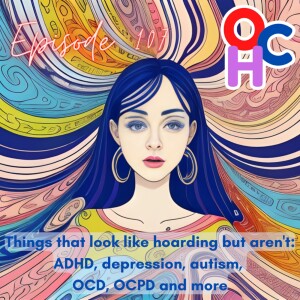
Friday Sep 01, 2023
#107 Things that look like hoarding but aren’t: ADHD, depression, autism, OCD, OCPD and more
In today's episode, we'll be delving into things that look like hoarding but aren't. Joining me is the incredible Dr. Jan Eppingstall, a specialist in hoarding disorder.
For the transcript for this episode, visit http://www.overcomecompulsivehoarding.co.uk
We explore the how to determine if someone has hoarding tendencies, shedding light on hoarding and its connections to other mental health conditions, such as OCD and OCPD. We'll discuss the criteria for these disorders and how they relate to hoarding behaviors. But hoarding is just the tip of the iceberg. We'll also explore the relationship between hoarding, autism, ADHD, and depression, uncovering the common symptoms and challenges in these overlapping conditions.
So, join us as we discuss things that may look like hoarding but aren't.
Understanding the cause of hoarding behaviours
OCD and OCPD are mental disorders characterized by anxiety and rigid personality traits. Hoarding was associated with OCPD
Overlap of symptoms
Depression makes daily tasks exhausting and meaningless
Autism and ADHD: understanding and terminology
Often mask to fit in
Recognise sensory needs, respect neurodivergence, ask questions
Rejection sensitive dysphoria, impulsiveness, and addiction in ADHD
Understanding the causes of hoarding behaviours is important
OCD and OCPD are mental disorders. OCD causes anxiety and impairs functioning. OCPD is a personality disorder with rigid traits
Hoarding was considered a subtype of OCPD
People with OCPD may not see their behaviours as problematic and may exhaust themselves trying to meet unrealistic standards
Do individuals feel responsible for the welfare of objects, are they emotionally attached to them, do they experience distress from clutter or the act of saving?
A potential opposite extreme of compulsive minimalism
Feeling exhausted and worthless, maintaining a tidy house becomes unimportant. A depression nest forms
Hoarding often starts at a young age. Time and untreated depression can worsen it
Bipolar disorder
Increased understanding and awareness leading to more assessments.
Women are often overlooked
Understanding and accommodating individuals with neurodivergence is important
Sensory needs and routines may vary
ADHD is highly heritable but can also be influenced by environmental stressors and trauma
Variable attention stimulus trait
Creating your own options and not being afraid of failure in self-help
ADHD, depression, and hoarding often co-occur
Other conditions like OCD, anxiety, bipolar disorder, social anxiety, bulimia, binge eating, gambling, and personality disorders can be linked to hoarding
Treatment is challenging but not impossible
Definitions and criteria for hoarding tendencies
Compulsive spartanism
Differences and similarities between OCD and OCPD
Criteria for OCPD based on Freud
Hoarding originally considered a subtype of OCPD
Labels and understanding underlying needs
Focus on purpose rather than the diagnosis
Unrealistic standards and exhaustion from trying to meet them
Sensitive dysphoria and euphoria
Feeling overwhelmed and exhausted in daily life
Accepting help without distress or shame
Depression nests
Relationship between ADHD, depression, and hoarding
OCD, generalized anxiety, bipolar disorder, social anxiety, eating disorders, addiction, and personality disorders
Hosted on Acast. See acast.com/privacy for more information.
No comments yet. Be the first to say something!